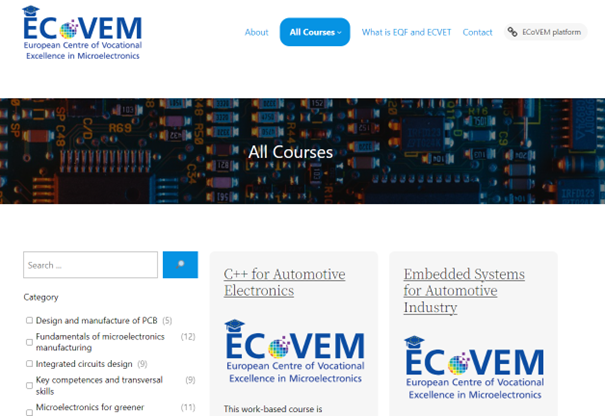The European ECoVEM project, in which SCS is a partner, has led to the development of 42 courses comprising 227 modules for initial and continuing training in microelectronics. These courses cover levels 3 to 8 of the European Qualifications Framework, i.e. from CAP/BEP to Doctorat/Bac +8.
The training programme has been developed in collaboration with industry partners in the microelectronics sector. This has enabled us to develop a curriculum that meets the current needs, standards and practical requirements of the industry, as well as future trends in the sector. Their development has involved an iterative process to ensure relevance, accuracy and applicability, with modules covering both theoretical and technical knowledge, as well as practical applications and cross-disciplinary skills. This also enhances the employability and preparation of people entering the labour market or wishing to progress in the field.
All the training modules are divided into the following subjects :
- Design and manufacture of PCB
The courses in this category form the ‘technician’ profile in PCB design and manufacture, including PCB design, board manufacture, assembly techniques such as through-hole assembly, surface mounting, etc. For a total of 150 hours. Levels 3 to 6, with a focus on level 4.
- Microelectronics packaging technologies
These courses offer specialisation in Assembly and Packaging of Integrated Devices and Circuits (ICs), Multi-Chip Modules, System in a Package, Printed Circuit Boards, with a total duration of 300 hours covering Assembly Techniques, Assembly, Passivation, Chip Packaging, Multi-Chip Modules, System in a Package. Levels 3 to 6, mainly levels 4 and 5.
- Fundamentals of microelectronics manufacturing
This category trains the profile of “specialised technician” in microelectronics manufacturing for a total of 300 hours covering subjects such as: introduction to advanced materials, transformation equipment, production processes, packaging and testing.
Levels 4 and 5.
- Integrated circuits design
This category offers an initial 300-hour specialization in microelectronics design, covering digital, analogue and mixed circuits (information processing and storage, RF and microwave, sensors and actuators). Levels 4 to 7.
- System design
The courses offer a second specialization in microelectronics design and engineering with a focus on research and innovation, with a total duration of 400 hours, covering systems-on-a-chip, systems-in-a-box, hardware/software co-design, and circuit and system testing. Levels 6 to 8.
- Microelectronics for greener economy and industrial applications
This category includes modules for the design and manufacture of photovoltaic systems, sensors for the Internet of Things (IoT) for smart cities, for smart buildings, the manufacture and packaging of electronic components for electric cars, etc. 300 hours.
Levels 3 to 8.
- Key competences & transversal skills
These courses provide training in the cross-disciplinary skills and competences required by industry (entrepreneurship, project management, communication, circular economy, etc.), delivered in an open education environment for a total of 100 hours.
Levels 3 to 6.
All 42 courses are open to everyone, and the vast majority can be accessed online via the dedicated platform. Some of them can be attended face-to-face, according to the timetable offered by the training centers that are partners of the ECoVEM project.
Zoom on the ECoVEM project
This project, coordinated by the Technical University of Sofia (Bulgaria), brings together a total of 21 partners from 7 European countries, including training centers, universities and engineering schools, professional and industrial associations and clusters. This project is funded under the European ERASMUS+ programme for a total of 4 years (01/11/2020 – 31/10/2024).
Objectives of the project :
- Establish a network of training centres (initial and continuing), companies, research institutions, associations and social partners, based on the exchange of good practices, ideas and experiences in microelectronics training.
- Develop innovative vocational training programmes in microelectronics
- Disseminate microelectronics applications and achievements in the fields of digitalisation, green energies, robotics, space technologies and medicine in order to increase the attractiveness of microelectronics.
- To combat discrimination, promote social inclusion and facilitate employability in the field of microelectronics training.
SCS project page | Project website | ECoVEM training plateform |
